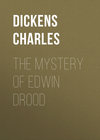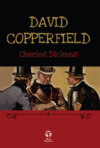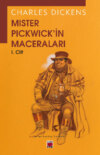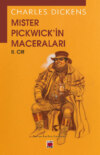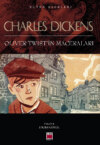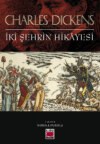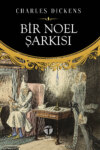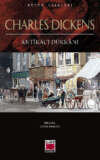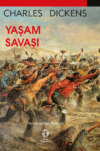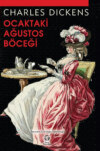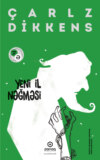Kitabı oku: «The Mystery of Edwin Drood», sayfa 5
CHAPTER VII – MORE CONFIDENCES THAN ONE
‘I know very little of that gentleman, sir,’ said Neville to the Minor Canon as they turned back.
‘You know very little of your guardian?’ the Minor Canon repeated.
‘Almost nothing!’
‘How came he – ’
‘To be my guardian? I’ll tell you, sir. I suppose you know that we come (my sister and I) from Ceylon?’
‘Indeed, no.’
‘I wonder at that. We lived with a stepfather there. Our mother died there, when we were little children. We have had a wretched existence. She made him our guardian, and he was a miserly wretch who grudged us food to eat, and clothes to wear. At his death, he passed us over to this man; for no better reason that I know of, than his being a friend or connexion of his, whose name was always in print and catching his attention.’
‘That was lately, I suppose?’
‘Quite lately, sir. This stepfather of ours was a cruel brute as well as a grinding one. It is well he died when he did, or I might have killed him.’
Mr. Crisparkle stopped short in the moonlight and looked at his hopeful pupil in consternation.
‘I surprise you, sir?’ he said, with a quick change to a submissive manner.
‘You shock me; unspeakably shock me.’
The pupil hung his head for a little while, as they walked on, and then said: ‘You never saw him beat your sister. I have seen him beat mine, more than once or twice, and I never forgot it.’
‘Nothing,’ said Mr. Crisparkle, ‘not even a beloved and beautiful sister’s tears under dastardly ill-usage;’ he became less severe, in spite of himself, as his indignation rose; ‘could justify those horrible expressions that you used.’
‘I am sorry I used them, and especially to you, sir. I beg to recall them. But permit me to set you right on one point. You spoke of my sister’s tears. My sister would have let him tear her to pieces, before she would have let him believe that he could make her shed a tear.’
Mr. Crisparkle reviewed those mental notes of his, and was neither at all surprised to hear it, nor at all disposed to question it.
‘Perhaps you will think it strange, sir,’ – this was said in a hesitating voice – ‘that I should so soon ask you to allow me to confide in you, and to have the kindness to hear a word or two from me in my defence?’
‘Defence?’ Mr. Crisparkle repeated. ‘You are not on your defence, Mr. Neville.’
‘I think I am, sir. At least I know I should be, if you were better acquainted with my character.’
‘Well, Mr. Neville,’ was the rejoinder. ‘What if you leave me to find it out?’
‘Since it is your pleasure, sir,’ answered the young man, with a quick change in his manner to sullen disappointment: ‘since it is your pleasure to check me in my impulse, I must submit.’
There was that in the tone of this short speech which made the conscientious man to whom it was addressed uneasy. It hinted to him that he might, without meaning it, turn aside a trustfulness beneficial to a mis-shapen young mind and perhaps to his own power of directing and improving it. They were within sight of the lights in his windows, and he stopped.
‘Let us turn back and take a turn or two up and down, Mr. Neville, or you may not have time to finish what you wish to say to me. You are hasty in thinking that I mean to check you. Quite the contrary. I invite your confidence.’
‘You have invited it, sir, without knowing it, ever since I came here. I say “ever since,” as if I had been here a week. The truth is, we came here (my sister and I) to quarrel with you, and affront you, and break away again.’
‘Really?’ said Mr. Crisparkle, at a dead loss for anything else to say.
‘You see, we could not know what you were beforehand, sir; could we?’
‘Clearly not,’ said Mr. Crisparkle.
‘And having liked no one else with whom we have ever been brought into contact, we had made up our minds not to like you.’
‘Really?’ said Mr. Crisparkle again.
‘But we do like you, sir, and we see an unmistakable difference between your house and your reception of us, and anything else we have ever known. This – and my happening to be alone with you – and everything around us seeming so quiet and peaceful after Mr. Honeythunder’s departure – and Cloisterham being so old and grave and beautiful, with the moon shining on it – these things inclined me to open my heart.’
‘I quite understand, Mr. Neville. And it is salutary to listen to such influences.’
‘In describing my own imperfections, sir, I must ask you not to suppose that I am describing my sister’s. She has come out of the disadvantages of our miserable life, as much better than I am, as that Cathedral tower is higher than those chimneys.’
Mr. Crisparkle in his own breast was not so sure of this.
‘I have had, sir, from my earliest remembrance, to suppress a deadly and bitter hatred. This has made me secret and revengeful. I have been always tyrannically held down by the strong hand. This has driven me, in my weakness, to the resource of being false and mean. I have been stinted of education, liberty, money, dress, the very necessaries of life, the commonest pleasures of childhood, the commonest possessions of youth. This has caused me to be utterly wanting in I don’t know what emotions, or remembrances, or good instincts – I have not even a name for the thing, you see! – that you have had to work upon in other young men to whom you have been accustomed.’
‘This is evidently true. But this is not encouraging,’ thought Mr. Crisparkle as they turned again.
‘And to finish with, sir: I have been brought up among abject and servile dependents, of an inferior race, and I may easily have contracted some affinity with them. Sometimes, I don’t know but that it may be a drop of what is tigerish in their blood.’
‘As in the case of that remark just now,’ thought Mr. Crisparkle.
‘In a last word of reference to my sister, sir (we are twin children), you ought to know, to her honour, that nothing in our misery ever subdued her, though it often cowed me. When we ran away from it (we ran away four times in six years, to be soon brought back and cruelly punished), the flight was always of her planning and leading. Each time she dressed as a boy, and showed the daring of a man. I take it we were seven years old when we first decamped; but I remember, when I lost the pocket-knife with which she was to have cut her hair short, how desperately she tried to tear it out, or bite it off. I have nothing further to say, sir, except that I hope you will bear with me and make allowance for me.’
‘Of that, Mr. Neville, you may be sure,’ returned the Minor Canon. ‘I don’t preach more than I can help, and I will not repay your confidence with a sermon. But I entreat you to bear in mind, very seriously and steadily, that if I am to do you any good, it can only be with your own assistance; and that you can only render that, efficiently, by seeking aid from Heaven.’
‘I will try to do my part, sir.’
‘And, Mr. Neville, I will try to do mine. Here is my hand on it. May God bless our endeavours!’
They were now standing at his house-door, and a cheerful sound of voices and laughter was heard within.
‘We will take one more turn before going in,’ said Mr. Crisparkle, ‘for I want to ask you a question. When you said you were in a changed mind concerning me, you spoke, not only for yourself, but for your sister too?’
‘Undoubtedly I did, sir.’
‘Excuse me, Mr. Neville, but I think you have had no opportunity of communicating with your sister, since I met you. Mr. Honeythunder was very eloquent; but perhaps I may venture to say, without ill-nature, that he rather monopolised the occasion. May you not have answered for your sister without sufficient warrant?’
Neville shook his head with a proud smile.
‘You don’t know, sir, yet, what a complete understanding can exist between my sister and me, though no spoken word – perhaps hardly as much as a look – may have passed between us. She not only feels as I have described, but she very well knows that I am taking this opportunity of speaking to you, both for her and for myself.’
Mr. Crisparkle looked in his face, with some incredulity; but his face expressed such absolute and firm conviction of the truth of what he said, that Mr. Crisparkle looked at the pavement, and mused, until they came to his door again.
‘I will ask for one more turn, sir, this time,’ said the young man, with a rather heightened colour rising in his face. ‘But for Mr. Honeythunder’s – I think you called it eloquence, sir?’ (somewhat slyly.)
‘I – yes, I called it eloquence,’ said Mr. Crisparkle.
‘But for Mr. Honeythunder’s eloquence, I might have had no need to ask you what I am going to ask you. This Mr. Edwin Drood, sir: I think that’s the name?’
‘Quite correct,’ said Mr. Crisparkle. ‘D-r-double o-d.’
‘Does he – or did he – read with you, sir?’
‘Never, Mr. Neville. He comes here visiting his relation, Mr. Jasper.’
‘Is Miss Bud his relation too, sir?’
(‘Now, why should he ask that, with sudden superciliousness?’ thought Mr. Crisparkle.) Then he explained, aloud, what he knew of the little story of their betrothal.
‘O! that’s it, is it?’ said the young man. ‘I understand his air of proprietorship now!’
This was said so evidently to himself, or to anybody rather than Mr. Crisparkle, that the latter instinctively felt as if to notice it would be almost tantamount to noticing a passage in a letter which he had read by chance over the writer’s shoulder. A moment afterwards they re-entered the house.
Mr. Jasper was seated at the piano as they came into his drawing-room, and was accompanying Miss Rosebud while she sang. It was a consequence of his playing the accompaniment without notes, and of her being a heedless little creature, very apt to go wrong, that he followed her lips most attentively, with his eyes as well as hands; carefully and softly hinting the key-note from time to time. Standing with an arm drawn round her, but with a face far more intent on Mr. Jasper than on her singing, stood Helena, between whom and her brother an instantaneous recognition passed, in which Mr. Crisparkle saw, or thought he saw, the understanding that had been spoken of, flash out. Mr. Neville then took his admiring station, leaning against the piano, opposite the singer; Mr. Crisparkle sat down by the china shepherdess; Edwin Drood gallantly furled and unfurled Miss Twinkleton’s fan; and that lady passively claimed that sort of exhibitor’s proprietorship in the accomplishment on view, which Mr. Tope, the Verger, daily claimed in the Cathedral service.
The song went on. It was a sorrowful strain of parting, and the fresh young voice was very plaintive and tender. As Jasper watched the pretty lips, and ever and again hinted the one note, as though it were a low whisper from himself, the voice became less steady, until all at once the singer broke into a burst of tears, and shrieked out, with her hands over her eyes: ‘I can’t bear this! I am frightened! Take me away!’
With one swift turn of her lithe figures Helena laid the little beauty on a sofa, as if she had never caught her up. Then, on one knee beside her, and with one hand upon her rosy mouth, while with the other she appealed to all the rest, Helena said to them: ‘It’s nothing; it’s all over; don’t speak to her for one minute, and she is well!’
Jasper’s hands had, in the same instant, lifted themselves from the keys, and were now poised above them, as though he waited to resume. In that attitude he yet sat quiet: not even looking round, when all the rest had changed their places and were reassuring one another.
‘Pussy’s not used to an audience; that’s the fact,’ said Edwin Drood. ‘She got nervous, and couldn’t hold out. Besides, Jack, you are such a conscientious master, and require so much, that I believe you make her afraid of you. No wonder.’
‘No wonder,’ repeated Helena.
‘There, Jack, you hear! You would be afraid of him, under similar circumstances, wouldn’t you, Miss Landless?’
‘Not under any circumstances,’ returned Helena.
Jasper brought down his hands, looked over his shoulder, and begged to thank Miss Landless for her vindication of his character. Then he fell to dumbly playing, without striking the notes, while his little pupil was taken to an open window for air, and was otherwise petted and restored. When she was brought back, his place was empty. ‘Jack’s gone, Pussy,’ Edwin told her. ‘I am more than half afraid he didn’t like to be charged with being the Monster who had frightened you.’ But she answered never a word, and shivered, as if they had made her a little too cold.
Miss Twinkleton now opining that indeed these were late hours, Mrs. Crisparkle, for finding ourselves outside the walls of the Nuns’ House, and that we who undertook the formation of the future wives and mothers of England (the last words in a lower voice, as requiring to be communicated in confidence) were really bound (voice coming up again) to set a better example than one of rakish habits, wrappers were put in requisition, and the two young cavaliers volunteered to see the ladies home. It was soon done, and the gate of the Nuns’ House closed upon them.
The boarders had retired, and only Mrs. Tisher in solitary vigil awaited the new pupil. Her bedroom being within Rosa’s, very little introduction or explanation was necessary, before she was placed in charge of her new friend, and left for the night.
‘This is a blessed relief, my dear,’ said Helena. ‘I have been dreading all day, that I should be brought to bay at this time.’
‘There are not many of us,’ returned Rosa, ‘and we are good-natured girls; at least the others are; I can answer for them.’
‘I can answer for you,’ laughed Helena, searching the lovely little face with her dark, fiery eyes, and tenderly caressing the small figure. ‘You will be a friend to me, won’t you?’
‘I hope so. But the idea of my being a friend to you seems too absurd, though.’
‘Why?’
‘O, I am such a mite of a thing, and you are so womanly and handsome. You seem to have resolution and power enough to crush me. I shrink into nothing by the side of your presence even.’
‘I am a neglected creature, my dear, unacquainted with all accomplishments, sensitively conscious that I have everything to learn, and deeply ashamed to own my ignorance.’
‘And yet you acknowledge everything to me!’ said Rosa.
‘My pretty one, can I help it? There is a fascination in you.’
‘O! is there though?’ pouted Rosa, half in jest and half in earnest. ‘What a pity Master Eddy doesn’t feel it more!’
Of course her relations towards that young gentleman had been already imparted in Minor Canon Corner.
‘Why, surely he must love you with all his heart!’ cried Helena, with an earnestness that threatened to blaze into ferocity if he didn’t.
‘Eh? O, well, I suppose he does,’ said Rosa, pouting again; ‘I am sure I have no right to say he doesn’t. Perhaps it’s my fault. Perhaps I am not as nice to him as I ought to be. I don’t think I am. But it is so ridiculous!’
Helena’s eyes demanded what was.
‘We are,’ said Rosa, answering as if she had spoken. ‘We are such a ridiculous couple. And we are always quarrelling.’
‘Why?’
‘Because we both know we are ridiculous, my dear!’ Rosa gave that answer as if it were the most conclusive answer in the world.
Helena’s masterful look was intent upon her face for a few moments, and then she impulsively put out both her hands and said:
‘You will be my friend and help me?’
‘Indeed, my dear, I will,’ replied Rosa, in a tone of affectionate childishness that went straight and true to her heart; ‘I will be as good a friend as such a mite of a thing can be to such a noble creature as you. And be a friend to me, please; I don’t understand myself: and I want a friend who can understand me, very much indeed.’
Helena Landless kissed her, and retaining both her hands said:
‘Who is Mr. Jasper?’
Rosa turned aside her head in answering: ‘Eddy’s uncle, and my music-master.’
‘You do not love him?’
‘Ugh!’ She put her hands up to her face, and shook with fear or horror.
‘You know that he loves you?’
‘O, don’t, don’t, don’t!’ cried Rosa, dropping on her knees, and clinging to her new resource. ‘Don’t tell me of it! He terrifies me. He haunts my thoughts, like a dreadful ghost. I feel that I am never safe from him. I feel as if he could pass in through the wall when he is spoken of.’ She actually did look round, as if she dreaded to see him standing in the shadow behind her.
‘Try to tell me more about it, darling.’
‘Yes, I will, I will. Because you are so strong. But hold me the while, and stay with me afterwards.’
‘My child! You speak as if he had threatened you in some dark way.’
‘He has never spoken to me about – that. Never.’
‘What has he done?’
‘He has made a slave of me with his looks. He has forced me to understand him, without his saying a word; and he has forced me to keep silence, without his uttering a threat. When I play, he never moves his eyes from my hands. When I sing, he never moves his eyes from my lips. When he corrects me, and strikes a note, or a chord, or plays a passage, he himself is in the sounds, whispering that he pursues me as a lover, and commanding me to keep his secret. I avoid his eyes, but he forces me to see them without looking at them. Even when a glaze comes over them (which is sometimes the case), and he seems to wander away into a frightful sort of dream in which he threatens most, he obliges me to know it, and to know that he is sitting close at my side, more terrible to me than ever.’
‘What is this imagined threatening, pretty one? What is threatened?’
‘I don’t know. I have never even dared to think or wonder what it is.’
‘And was this all, to-night?’
‘This was all; except that to-night when he watched my lips so closely as I was singing, besides feeling terrified I felt ashamed and passionately hurt. It was as if he kissed me, and I couldn’t bear it, but cried out. You must never breathe this to any one. Eddy is devoted to him. But you said to-night that you would not be afraid of him, under any circumstances, and that gives me – who am so much afraid of him – courage to tell only you. Hold me! Stay with me! I am too frightened to be left by myself.’
The lustrous gipsy-face drooped over the clinging arms and bosom, and the wild black hair fell down protectingly over the childish form. There was a slumbering gleam of fire in the intense dark eyes, though they were then softened with compassion and admiration. Let whomsoever it most concerned look well to it!
CHAPTER VIII – DAGGERS DRAWN
The two young men, having seen the damsels, their charges, enter the courtyard of the Nuns’ House, and finding themselves coldly stared at by the brazen door-plate, as if the battered old beau with the glass in his eye were insolent, look at one another, look along the perspective of the moonlit street, and slowly walk away together.
‘Do you stay here long, Mr. Drood?’ says Neville.
‘Not this time,’ is the careless answer. ‘I leave for London again, to-morrow. But I shall be here, off and on, until next Midsummer; then I shall take my leave of Cloisterham, and England too; for many a long day, I expect.’
‘Are you going abroad?’
‘Going to wake up Egypt a little,’ is the condescending answer.
‘Are you reading?’
‘Reading?’ repeats Edwin Drood, with a touch of contempt. ‘No. Doing, working, engineering. My small patrimony was left a part of the capital of the Firm I am with, by my father, a former partner; and I am a charge upon the Firm until I come of age; and then I step into my modest share in the concern. Jack – you met him at dinner – is, until then, my guardian and trustee.’
‘I heard from Mr. Crisparkle of your other good fortune.’
‘What do you mean by my other good fortune?’
Neville has made his remark in a watchfully advancing, and yet furtive and shy manner, very expressive of that peculiar air already noticed, of being at once hunter and hunted. Edwin has made his retort with an abruptness not at all polite. They stop and interchange a rather heated look.
‘I hope,’ says Neville, ‘there is no offence, Mr. Drood, in my innocently referring to your betrothal?’
‘By George!’ cries Edwin, leading on again at a somewhat quicker pace; ‘everybody in this chattering old Cloisterham refers to it I wonder no public-house has been set up, with my portrait for the sign of The Betrothed’s Head. Or Pussy’s portrait. One or the other.’
‘I am not accountable for Mr. Crisparkle’s mentioning the matter to me, quite openly,’ Neville begins.
‘No; that’s true; you are not,’ Edwin Drood assents.
‘But,’ resumes Neville, ‘I am accountable for mentioning it to you. And I did so, on the supposition that you could not fail to be highly proud of it.’
Now, there are these two curious touches of human nature working the secret springs of this dialogue. Neville Landless is already enough impressed by Little Rosebud, to feel indignant that Edwin Drood (far below her) should hold his prize so lightly. Edwin Drood is already enough impressed by Helena, to feel indignant that Helena’s brother (far below her) should dispose of him so coolly, and put him out of the way so entirely.
However, the last remark had better be answered. So, says Edwin:
‘I don’t know, Mr. Neville’ (adopting that mode of address from Mr. Crisparkle), ‘that what people are proudest of, they usually talk most about; I don’t know either, that what they are proudest of, they most like other people to talk about. But I live a busy life, and I speak under correction by you readers, who ought to know everything, and I daresay do.’
By this time they had both become savage; Mr. Neville out in the open; Edwin Drood under the transparent cover of a popular tune, and a stop now and then to pretend to admire picturesque effects in the moonlight before him.
‘It does not seem to me very civil in you,’ remarks Neville, at length, ‘to reflect upon a stranger who comes here, not having had your advantages, to try to make up for lost time. But, to be sure, I was not brought up in “busy life,” and my ideas of civility were formed among Heathens.’
‘Perhaps, the best civility, whatever kind of people we are brought up among,’ retorts Edwin Drood, ‘is to mind our own business. If you will set me that example, I promise to follow it.’
‘Do you know that you take a great deal too much upon yourself?’ is the angry rejoinder, ‘and that in the part of the world I come from, you would be called to account for it?’
‘By whom, for instance?’ asks Edwin Drood, coming to a halt, and surveying the other with a look of disdain.
But, here a startling right hand is laid on Edwin’s shoulder, and Jasper stands between them. For, it would seem that he, too, has strolled round by the Nuns’ House, and has come up behind them on the shadowy side of the road.
‘Ned, Ned, Ned!’ he says; ‘we must have no more of this. I don’t like this. I have overheard high words between you two. Remember, my dear boy, you are almost in the position of host to-night. You belong, as it were, to the place, and in a manner represent it towards a stranger. Mr. Neville is a stranger, and you should respect the obligations of hospitality. And, Mr. Neville,’ laying his left hand on the inner shoulder of that young gentleman, and thus walking on between them, hand to shoulder on either side: ‘you will pardon me; but I appeal to you to govern your temper too. Now, what is amiss? But why ask! Let there be nothing amiss, and the question is superfluous. We are all three on a good understanding, are we not?’
After a silent struggle between the two young men who shall speak last, Edwin Drood strikes in with: ‘So far as I am concerned, Jack, there is no anger in me.’
‘Nor in me,’ says Neville Landless, though not so freely; or perhaps so carelessly. ‘But if Mr. Drood knew all that lies behind me, far away from here, he might know better how it is that sharp-edged words have sharp edges to wound me.’
‘Perhaps,’ says Jasper, in a soothing manner, ‘we had better not qualify our good understanding. We had better not say anything having the appearance of a remonstrance or condition; it might not seem generous. Frankly and freely, you see there is no anger in Ned. Frankly and freely, there is no anger in you, Mr. Neville?’
‘None at all, Mr. Jasper.’ Still, not quite so frankly or so freely; or, be it said once again, not quite so carelessly perhaps.
‘All over then! Now, my bachelor gatehouse is a few yards from here, and the heater is on the fire, and the wine and glasses are on the table, and it is not a stone’s throw from Minor Canon Corner. Ned, you are up and away to-morrow. We will carry Mr. Neville in with us, to take a stirrup-cup.’
‘With all my heart, Jack.’
‘And with all mine, Mr. Jasper.’ Neville feels it impossible to say less, but would rather not go. He has an impression upon him that he has lost hold of his temper; feels that Edwin Drood’s coolness, so far from being infectious, makes him red-hot.
Mr. Jasper, still walking in the centre, hand to shoulder on either side, beautifully turns the Refrain of a drinking song, and they all go up to his rooms. There, the first object visible, when he adds the light of a lamp to that of the fire, is the portrait over the chimneypicce. It is not an object calculated to improve the understanding between the two young men, as rather awkwardly reviving the subject of their difference. Accordingly, they both glance at it consciously, but say nothing. Jasper, however (who would appear from his conduct to have gained but an imperfect clue to the cause of their late high words), directly calls attention to it.
‘You recognise that picture, Mr. Neville?’ shading the lamp to throw the light upon it.
‘I recognise it, but it is far from flattering the original.’
‘O, you are hard upon it! It was done by Ned, who made me a present of it.’
‘I am sorry for that, Mr. Drood.’ Neville apologises, with a real intention to apologise; ‘if I had known I was in the artist’s presence – ’
‘O, a joke, sir, a mere joke,’ Edwin cuts in, with a provoking yawn. ‘A little humouring of Pussy’s points! I’m going to paint her gravely, one of these days, if she’s good.’
The air of leisurely patronage and indifference with which this is said, as the speaker throws himself back in a chair and clasps his hands at the back of his head, as a rest for it, is very exasperating to the excitable and excited Neville. Jasper looks observantly from the one to the other, slightly smiles, and turns his back to mix a jug of mulled wine at the fire. It seems to require much mixing and compounding.
‘I suppose, Mr. Neville,’ says Edwin, quick to resent the indignant protest against himself in the face of young Landless, which is fully as visible as the portrait, or the fire, or the lamp: ‘I suppose that if you painted the picture of your lady love – ’
‘I can’t paint,’ is the hasty interruption.
‘That’s your misfortune, and not your fault. You would if you could. But if you could, I suppose you would make her (no matter what she was in reality), Juno, Minerva, Diana, and Venus, all in one. Eh?’
‘I have no lady love, and I can’t say.’
‘If I were to try my hand,’ says Edwin, with a boyish boastfulness getting up in him, ‘on a portrait of Miss Landless – in earnest, mind you; in earnest – you should see what I could do!’
‘My sister’s consent to sit for it being first got, I suppose? As it never will be got, I am afraid I shall never see what you can do. I must bear the loss.’
Jasper turns round from the fire, fills a large goblet glass for Neville, fills a large goblet glass for Edwin, and hands each his own; then fills for himself, saying:
‘Come, Mr. Neville, we are to drink to my nephew, Ned. As it is his foot that is in the stirrup – metaphorically – our stirrup-cup is to be devoted to him. Ned, my dearest fellow, my love!’
Jasper sets the example of nearly emptying his glass, and Neville follows it. Edwin Drood says, ‘Thank you both very much,’ and follows the double example.
‘Look at him,’ cries Jasper, stretching out his hand admiringly and tenderly, though rallyingly too. ‘See where he lounges so easily, Mr. Neville! The world is all before him where to choose. A life of stirring work and interest, a life of change and excitement, a life of domestic ease and love! Look at him!’
Edwin Drood’s face has become quickly and remarkably flushed with the wine; so has the face of Neville Landless. Edwin still sits thrown back in his chair, making that rest of clasped hands for his head.
‘See how little he heeds it all!’ Jasper proceeds in a bantering vein. ‘It is hardly worth his while to pluck the golden fruit that hangs ripe on the tree for him. And yet consider the contrast, Mr. Neville. You and I have no prospect of stirring work and interest, or of change and excitement, or of domestic ease and love. You and I have no prospect (unless you are more fortunate than I am, which may easily be), but the tedious unchanging round of this dull place.’
‘Upon my soul, Jack,’ says Edwin, complacently, ‘I feel quite apologetic for having my way smoothed as you describe. But you know what I know, Jack, and it may not be so very easy as it seems, after all. May it, Pussy?’ To the portrait, with a snap of his thumb and finger. ‘We have got to hit it off yet; haven’t we, Pussy? You know what I mean, Jack.’
His speech has become thick and indistinct. Jasper, quiet and self-possessed, looks to Neville, as expecting his answer or comment. When Neville speaks, his speech is also thick and indistinct.
‘It might have been better for Mr. Drood to have known some hardships,’ he says, defiantly.
‘Pray,’ retorts Edwin, turning merely his eyes in that direction, ‘pray why might it have been better for Mr. Drood to have known some hardships?’
‘Ay,’ Jasper assents, with an air of interest; ‘let us know why?’
‘Because they might have made him more sensible,’ says Neville, ‘of good fortune that is not by any means necessarily the result of his own merits.’
Mr. Jasper quickly looks to his nephew for his rejoinder.
‘Have you known hardships, may I ask?’ says Edwin Drood, sitting upright.
Mr. Jasper quickly looks to the other for his retort.
